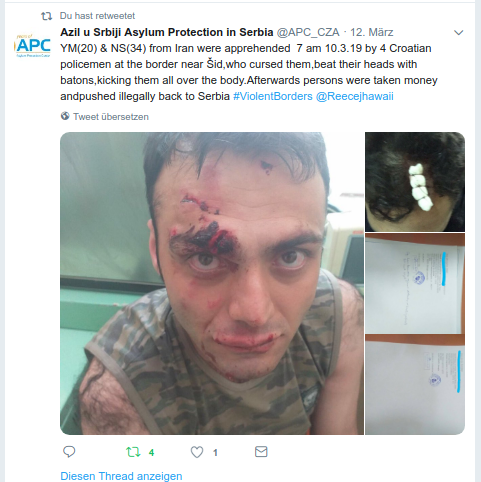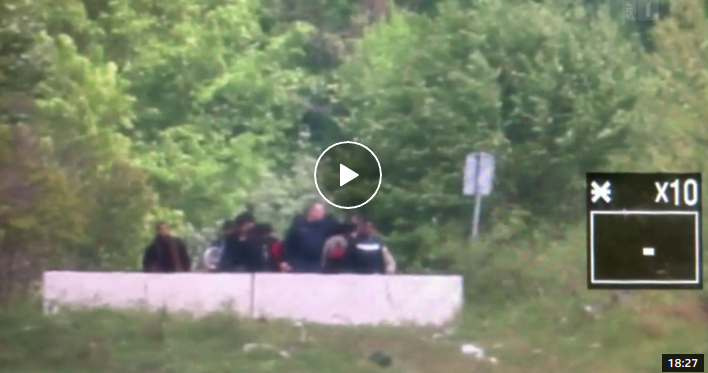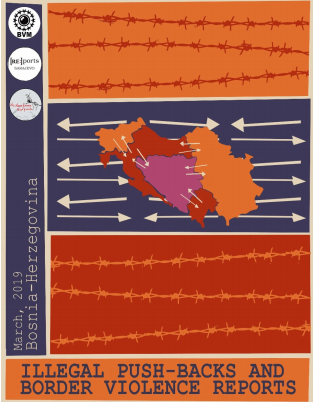H-Alter received a letter from a hiker who witnessed police violence against migrants on Risnjak. We publish the letter in its entirety. “When we got to the living room of the hut, I saw an automatic rifle on the table and two special forces officers talking to the home manager. Around 11 in the evening, migrants came. They were asking for water. The officers came out with batons and started to hit them, and one (or more) officers started shooting. In a situation where you have people who ask for water, and on the other side those who respond with gunfire and batons, with the approval of the majority of people present, you really have to wonder if you are in this situation on the side of the people or the beasts”,
800 Menschen auf ehemaliger Mülldeponie entsorgt
Die Lage im bosnischen Bihać nahe der EU-Grenze ist im Juni dramatisch eskaliert. Vor zwei Wochen ist es zu gewalttätigen Auseinandersetzungen zwischen Migrantengruppen auf den Straßen der Stadt gekommen. Die Behörden zwangen daraufhin 800 Flüchtlinge, auf einer Mülldeponie zu campieren.
Held back from EU by Croatia, refugees stuck in Bosnia
Regional authorities have decided to build a new camp for displaced people in Vucjak, a former garbage dump about 8 kilometers (5 miles) outside of Bihac. There is no infrastructure, no running water, no electricity; the environment is toxic. The plan is to house 400 displaced people there initially.
UN Country Team in BiH: Joint Statement on Relocation of Migrants and Refugees to a location near Bihać
Today, authorities in Una Sana Canton have started the relocation of migrants and refugees residing in private accommodation in Bihac to a new location identified by the Bihac City Council as “Vucjak”. The UN expresses serious concern with regard to this decision, as we firmly believe that this location is entirely inadequate for the purpose of accommodating people there. We call upon the authorities to immediately cease this relocation until a more suitable place is available. The UN urges the authorities to allow migrants and refugees already relocated to “Vucjak” to return.
“Vucjak” poses very significant health and safety risks and is currently not equipped to accommodate migrants and refugees in accordance with international standards. The site is located very close to landmine infected areas. There is also a high fire and explosion hazard due to the possible presence of methane gas underground, as the site was a former landfill. Unless these two serious risks are assessed and eliminated by the relevant authorities, the site is unsuitable for human habitation. In addition, there are no sanitary facilities available on the site and no access to running water or electricity. Under these circumstances, locating migrants and refugees there is not acceptable.
Kroatische Polizei bei illegaler Abschiebung gefilmt
AYS Daily Digest 1/5/19: (Save the) Children Sleeping Rough in Tuzla
It has been months since a couple of Tuzlans started assisting people on the move passing through their city on their way towards the western part of Bosnia and Herzegovina. Since then, as we keep reporting, the number of those arriving, as well as the number of locals who joined in helping have risen.
While their Croatian counterparts catch international attention with their inhumane approach towards people at the border, but also those in different cities attempting to realize their human and international rights, the Slovenian police has silently been working hand in hand with them
Report: ILLEGAL PUSH-BACKS AND BORDER VIOLENCE REPORTS (March 2019)
News Amnesty Report
This report sheds light on human rights violations against refugees and migrants along the Western Balkans route, focusing on Bosnia and Herzegovina, Croatia, and Slovenia. It finds that widespread pushbacks and collective expulsions – often accompanied with violence – and routine denial of access to asylum are a regular occurrence on the border between Bosnia and Herzegovina and Croatia. They are also a part of the systemic and deliberate policy of the Croatian authorities to discourage future irregular entries and demonstrate that Croatia can effectively protect the EU’s external border. Similar trend of pushbacks and collective expulsions has been documented on the Slovenian and, to a lesser degree, Italian borders.

Border violence report: An update on the situation in Velika Kladuša
As of mid-January, the UNHCR estimates there are upwards of 5,000 refugees and migrants currently present in Bosnia-Herzegovina. Of this number, more than 500 likely reside in the IOM-run Miral camp outside of Velika Kladuša. In the last month, camp residents reported abuses of authority from the private security guards who monitor the camp. Rumors abound about whether or not the camp will become “closed” in the coming months. Moreover, confusion abounds about the official capacity of the camp.
Den ganzen Beitrag lesen
Beaten at the border near Šid



